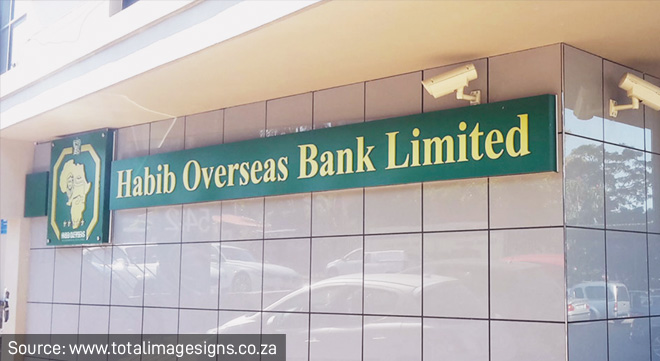The reasons for placing Habib Overseas Bank Limited under curatorship were unrelated to the recent “difficulties” with banks in the United States and Switzerland, the South African Reserve Bank (Sarb) said.
Minister of Finance Enoch Godongwana placed Habib Overseas Bank under curatorship on 26 March, citing governance, compliance, and operational failures and the need to protect the bank’s depositors.
The decision was taken on recommendation from the Prudential Authority (PA) and the Sarb.
Habib Overseas Bank is “a small financial institution” that was licensed as a bank in 1990. It provides, among other things, term loans, overdrafts, mortgages, bills of exchange and credit facilities.
The total value of all retail depositors’ claims was R690 million at the end of January 2023, and the bank has about 2 906 customer accounts, according to the Sarb.
“South Africa’s banking sector remains healthy and robust, and it is unlikely that other South African banks will be negatively affected by Habib Overseas Bank’s current situation,” it said.
Habib Overseas Bank is the local division of a lender that was originally founded in India in 1941 before relocating to Pakistan. It is not linked to Habib Bank AG Zurich, which also operates in South Africa.
“Over the past four years, the PA had intensified its supervision of Habib Overseas Bank because of identified weaknesses in the bank’s governance process, its internal control environment, as well as the various investigations and reviews which have repeatedly confirmed the bank’s non-compliance with a number of financial sector regulations. This non-compliance also relates to significant findings relating to breaches of exchange control regulations.”
The Sarb said the bank’s board of directors and management have failed to deal effectively with the weaknesses in controls and its poor regulatory compliance, as well as the growing risks over its ability to meet future obligations as required by the Banks Act and the regulations relating to banks.
Curator is now in control
Godongwana appointed PwC as the curator, with Craig du Plessis as the audit firm’s representative who will be responsible for Habib Overseas Bank.
The board and management of Habib Overseas Bank have been relieved of all their powers, which now vest with the curator, subject to the supervision of the PA.
Du Plessis will make decisions regarding the bank’s continued granting of loans and banking activities generally. The curator is also required to recover and take possession of all the bank’s assets.
On 29 March, Du Plessis informed staff, customers and other stakeholders that the bank will remain closed until further notice, effectively extending the initial 72-hour precautionary closure meant to prevent a run on deposits.
“We are still in the process of assessing the financial status of the bank and are committed to finalising this work as soon as practically possible,” said Du Plessis. “This action has again been taken to protect all stakeholders of the bank.”
The decision means the branches and all operational aspects of Habib Overseas Bank will remain closed until the curator is able to provide further updates. However, customers with loans and other credit facilities are still legally obliged to continue paying their monthly instalments.
The curator can be contacted at curatorhabiboverseas@pwc.com
The Sarb said Habib Overseas Bank was liquid, with a liquidity coverage ratio above the regulatory requirement, and there are no immediate concerns for depositors, which means their funds remain safe at the bank.
Linked to the Guptas
In November 2016, the Mail & Guardian reported that Habib Overseas Bank became the target of a buyout attempt by individuals linked to the Guptas. The newspaper reported that Salim Essa (who held stakes in Gupta-linked VR Laser Services, Tegeta Exploration and Resources, and Vardospan) and Hamza Farooqui had offered to buy Habib Overseas Bank’s South African assets for about R450 million.
At the time, the Guptas were struggling to access financial services after four of South Africa’s largest banks closed their business accounts after allegations of illicit financial activity mentioned in then public protector Thuli Madonsela’s report on state capture. The Competition Commission approved a proposed merger between Vardospan and Habib Overseas Bank in January 2017, although the proposed deal was conditional on regulatory approval being granted.
On 31 March 2017, the Pretoria High Court struck down an application by Vardospan to compel the Sarb, National Treasury, and the registrar of banks to approve the deal.



